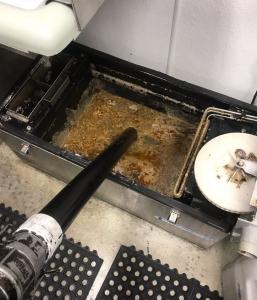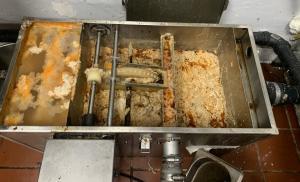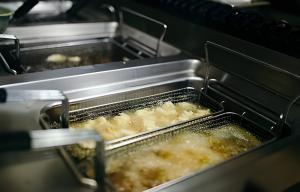Improper Used Oil Disposal Threatens Waterways, Inland Empire Grease Pumping Experts Urge Restaurants to Act Responsibly

Inland Empire Grease Company service truck ready for grease trap cleaning and used cooking oil collection across Riverside and San Bernardino Counties.

Technicians from Inland Empire Grease Company performing grease trap pumping to safely remove fats, oils, and grease from a commercial kitchen.
Improper oil disposal harms Riverside and San Bernardino waterways; experts urge proper grease trap cleaning and used oil collection to protect the environment.
When used oil is poured down drains or discarded improperly, it doesn’t just disappear, it congeals inside pipelines, causing costly blockages, sanitary sewer overflows, and contamination of storm drains and groundwater. These incidents strain public infrastructure and increase maintenance costs for cities already battling drought and pollution challenges. Local grease management experts are urging commercial kitchens to adopt responsible waste handling practices. Through proper collection, recycling, and education, the company helps local businesses stay compliant while protecting the region’s most precious resource- clean and safe to drink water.
The Inland Empire is one of the fastest-growing regions in Southern California, home to a booming food and hospitality scene. From restaurants and cafés to food processors, catering services, and large-scale food manufacturing facilities, the region continues to expand at an incredible pace. This growth brings opportunity, but it also increases the demand for proper grease management, compliance, and reliable service partners. Across Riverside and San Bernardino Counties, the food service industry continues to grow as new establishments open to meet the demands of a rapidly expanding population. However, with this growth comes an increasing amount of waste cooking oil and grease. It’s estimated that even a small restaurant can produce five to ten gallons of used oil each day, while larger kitchens and industrial operations may generate hundreds of gallons weekly. When multiplied across the region, the volume of waste oil produced daily is staggering. This waste doesn’t just vanish after a meal is served. If not managed properly, it can wreak havoc on internal plumbing systems. Cooking oils and animal fats that are washed down kitchen drains quickly cool and solidify inside pipes. Over time, this buildup narrows passageways, slows drainage, and traps food debris. Eventually, it leads to full blockages that can shut down kitchen operations entirely. Many restaurant owners discover too late that grease buildup can corrode pipes, cause backups into kitchen floors, and require expensive emergency plumbing services. These are preventable problems- but only with consistent maintenance and responsible disposal.
The environmental consequences extend far beyond the kitchen. When grease enters the municipal sewer system, it combines with other waste materials to form massive blockages known as “fatbergs.” These dense, waxy formations can clog entire sections of public sewer lines, leading to sanitary sewer overflows that discharge untreated wastewater into streets, storm drains, and rivers. In the Inland Empire, where much of the region relies on local aquifers and the Santa Ana River Basin for water supply, contamination from sewage overflows poses serious risks to public health and the environment.
Polluted runoff affects everything- from the water used in homes and schools to the delicate ecosystems of local wetlands. When oil and grease reach these natural waterways, they coat the surface and block oxygen exchange, suffocating fish and aquatic plants. Over time, this leads to decreased biodiversity and long-term ecological damage. It’s a chain reaction that starts in a single kitchen sink and ends in the wider environment.
Experts warn that ignoring proper grease management isn’t just environmentally irresponsible but also it’s financially reckless. A single sewer overflow incident can cost thousands of dollars in cleanup fees, fines, and lost business. Local agencies across California have strict regulations for FOG control, and non-compliance can lead to citations or even temporary business closures. Additionally, insurance rarely covers the damage caused by internal sewer backups or environmental violations. According to environmental compliance experts, prevention costs far less than repair. Scheduling regular grease trap cleaning and arranging timely used cooking oil collection are among the simplest ways for restaurant owners to safeguard their operations. Routine maintenance ensures that wastewater flows freely and prevents buildup before it becomes a problem. More importantly, proper recycling of used oil turns waste into something very useful- biofuels, animal feed additives, and industrial lubricants. These recycled products contribute to California’s circular economy, reducing dependence on fossil fuels and lowering carbon emissions.
Grease trap cleaners and used oil collectors play an essential role in this system. Their work may go unseen, but it keeps entire cities running smoothly. Certified grease trap service providers ensure that waste is safely removed, transported, and recycled according to environmental standards. They document every collection to prove compliance and protect businesses from regulatory penalties. Without them, local infrastructure would face constant strain, and water quality across the Inland Empire would decline rapidly. Finding a reliable service provider is crucial. Restaurant owners should look for companies that are licensed by the local municipal authority of the Inland Empire, insured, and approved by local health and environmental departments. A professional provider offers scheduled maintenance, emergency response, and transparent reporting. They also help educate kitchen staff about proper waste handling practices, from scraping food waste into containers to never pouring oil or grease down drains. These small steps make a major difference in preventing blockages and protecting public resources.
Sustainability isn’t just a policy goal, it’s a shared responsibility. Every restaurant that commits to proper grease management helps reduce pollution, preserve clean water, and protect the infrastructure we all rely on. Companies like San Bernardino Grease have made this process simple and accessible. They serve businesses of all sizes with prompt collection, compliant documentation, and environmentally responsible recycling. Their goal is not just to clean traps or collect oil, but to build long-term partnerships that strengthen the community’s environmental integrity. By working together, local food establishments and service providers can ensure that the Inland Empire remains a clean, thriving region for generations to come.
Anik H.
Inland Empire Grease Company
+1 888-789-1090
Webmaster@thegreasecompany.com
Legal Disclaimer:
EIN Presswire provides this news content "as is" without warranty of any kind. We do not accept any responsibility or liability for the accuracy, content, images, videos, licenses, completeness, legality, or reliability of the information contained in this article. If you have any complaints or copyright issues related to this article, kindly contact the author above.


